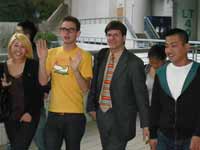In the third installment of our series this week taking a closer look at the positive impact of foreign students on state economies and featuring real-life stories about their presence on campuses and communities around the country, we turn to the western states. There, foreign students spent nearly $4.2 billion during the 2008-2009 academic year across the region, according to NAFSA's Economic Impact Statements released Monday. Overall, foreign students and their dependents contributed $17.6 billion to the U.S. economy in the same time period.
See how each state benefited in this chart and keep reading for a first-hand account of how the economic crisis in California is impacting one international educator's efforts and the lives of his students.
In Tough Times, It's Important to Remind a Campus of the Tremendous Educational Benefits of International Education
 By David Wick
By David Wick
This year International Education Week (IEW), the Open Doors report, and the Economic Impact Statements have had a different meaning in our office at San Francisco State University. Budget cuts have led to over 300 class cancellations, the elimination of the January intersession, no new admissions for spring, and severe limitations on fall admissions. Thus, class space is at a premium. Some are seeing international students as a threat to local students trying to enter the system or who are unable to get the classes they need. The reductions in office budgets, staff time, and pay through furloughs provide additional challenges.
In this environment, celebrating international education on our campus has been a delicate matter. We decided to continue our 10th celebration of IEW with a greatly reduced budget and more reliance on volunteer help. We have found that it is giving us a chance to showcase the impact that international education has on our campus community. Moreover, it reminds us of the educational and cultural relevance of our work. In over 100 events campus-wide, faculty, staff, and students are having the opportunity to connect, engage, and learn about other countries and cultures. Because of current concerns, study abroad country sessions focused more on opportunities to make academic progress abroad than on recreation, as students increasingly see study abroad as a way to access a full schedule of classes. In speeches and presentations, faculty and administrators have extolled the educational benefits of having international students on our campus and in our classrooms over the economic impact. Throughout these activities the international students themselves have stood out as vibrant contributors to the academic and intellectual life of the campus.
The economic benefits of international students and their dependents as documented in the Economic Impact Statements are powerful tools for gaining support for international education on and off campus. In 2007 and 2008, they were important during conversations with policy makers in Washington, DC at NAFSA's Advocacy Day. During those visits it was easy to get attention with the millions of dollars that international students and their dependents brought into the U.S. economy. I remember a challenging discussion with Senator Dianne Feinstein's staff about immigration difficulties for international students and scholars. We reached a point where our immigration discussion was going nowhere, but when we turned to the Economic Impact Statements our conversation became productive again.
Today, it seems that our educational arguments have as much traction as the economic ones. We can demonstrate that participating in our study abroad programs helps students make progress toward graduation and frees up space on campus. Since IEW events showcase everything from film projects by international students and scholars to food, dance, and music, the campus will clearly see how these students contribute to campus life. The fact that many professors are offering extra credit for attendance at IEW events underscores the educational benefit that they attribute to these events. By reminding the campus of the tremendous educational benefits of international education, IEW has changed the topic of discussion from the budget crisis back to education. This may give us the opportunity we need to have discussions about the other impacts of these activities with the support of the updated Economic Impact Statements and Open Doors data.
David Wick is the coordinator of Study Abroad Services at San Francisco State University. He is NAFSA's California state whip and chair of the NAFSA Academy. These reflections are representative of his personal views only.
